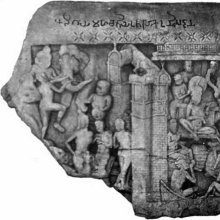Mahilamukha Jataka, Mahilāmukha-jātaka: 1 definition
Introduction:
Mahilamukha Jataka means something in Buddhism, Pali. If you want to know the exact meaning, history, etymology or English translation of this term then check out the descriptions on this page. Add your comment or reference to a book if you want to contribute to this summary article.
Images (photo gallery)
In Buddhism
Theravada (major branch of Buddhism)
Source: Pali Kanon: Pali Proper NamesBrahmadatta, king of Benares, owned a state elephant, called Mahilamukha, who was gentle and good. One day thieves sat down outside his stable and started talking of their plans for robbery, and murder. Several days in succession this happened, until at last, by dint of listening to them, Mahilamukha became cruel and began to kill his keepers. The king sent his minister, the Bodhisatta, to investigate the matter. He discovered what had happened, and made good men sit outside the stables who talked of various virtues. The elephant regained his former goodness and gentleness.
The story was related in reference to a monk who was persuaded by a friend to eat at the monastery of Gayasisa, built for Devadatta by Ajatuattu. The monk would steal off there at the hour of the meal and then return to Veluvana. After some time his guilty secret was discovered, and he was admonished by the Buddha. He is identified with Mahilamukha and the king with Ananda. J.i.185 8; see also Giridanta and Manoja Jatakas.
Mahisa Jataka (No. 278). The Bodhisatta, was born once as a buffalo in Himava. One day, as he stood under a tree, a monkey fouled him, and taking hold of his horn pulled him about. But the buffalo showed no resentment. This happened several times, and on being asked by the spirit of the tree why he endured it, the buffalo answered that it was by virtue of his goodness. Later the monkey tried his games on another buffalo, who killed him.
The story was told in reference to a monkey who, in the same way, fouled an elephant of Savatthi and escaped unhurt owing to the patience of the elephant. On another day a fierce elephant came from the stables and the monkey was trampled to death. J.i.385 7.
Theravāda is a major branch of Buddhism having the the Pali canon (tipitaka) as their canonical literature, which includes the vinaya-pitaka (monastic rules), the sutta-pitaka (Buddhist sermons) and the abhidhamma-pitaka (philosophy and psychology).
See also (Relevant definitions)
Partial matches: Mahilamukha, Jataka.
Full-text: Mahilamukha, Vipakkhasevaka Bhikkhu Vatthu, Giridanta Jataka.
Relevant text
Search found 3 books and stories containing Mahilamukha Jataka, Mahilāmukha-jātaka; (plurals include: Mahilamukha Jatakas, jātakas). You can also click to the full overview containing English textual excerpts. Below are direct links for the most relevant articles:
Amaravati Art in the Context of Andhra Archaeology (by Sreyashi Ray chowdhuri)
Mahilāmukha Jātaka < [Chapter 3 - Amarāvatī and the Formative Stage of the Buddhist Art]
The Jataka tales [English], Volume 1-6 (by Robert Chalmers)
Jataka 184: Giridanta-jātaka < [Book II - Dukanipāta]
Jataka 26: Mahilāmukha-jātaka < [Book I - Ekanipāta]
Dhammapada (Illustrated) (by Ven. Weagoda Sarada Maha Thero)
Verse 365-366 - The Story of the Traitor Monk < [Chapter 25 - Bhikkhu Vagga (The Monk)]
